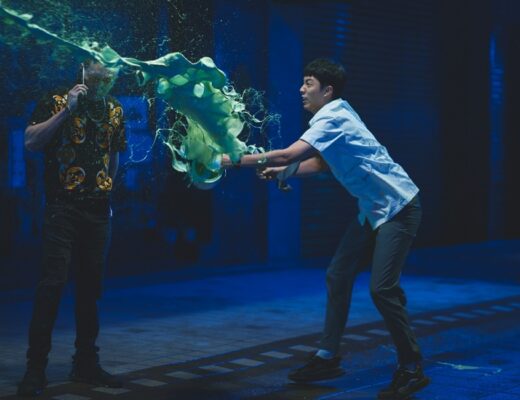Pierre Creton’s acclaimed 2017 documentary Va, Toto! was, among other things, an examination of the lives of elderly gay men in rural France, depicting their aging bodies as they work the land, and one another. Creton brings this subject matter into the fictional realm with A Prince, a film that combines narrative convolutions with a rare formal limpidity. In its awkward precision, A Prince is likely to remind some viewers of the early films of Alain Guiraudie, but Creton replaces that director’s bucolic surrealism with an almost Straubian directness. And while more conventional aspects of cinema, such as plot and characterization, remain opaque, Creton makes the themes and subtext of A Prince so blatant as to be almost inane.
The film centers on a young man named Pierre-Joseph, a seemingly simple soul who, almost by accident, discovers a penchant for gardening. By devoting his life to horticulture, Pierre-Joseph finds not only a vocation, but a seemingly endless string of male lovers. In one of the film’s most unique and bizarre strategies, the main character roles are split, with one actor appearing on-screen while another articulates their thoughts in voiceover. For example, young Pierre-Joseph is vocalized by Grégory Gadebois, but physically manifested by Antoine Pirotte. That’s until the final third of the film, however, when in a single scene, young Pierre-Joseph is replaced by middle-aged Pierre-Joseph, played by the director himself. P-J’s journey eventually lands him in a three-man polycule with two elderly gardeners: Alberto (Vincent Barré on-screen, voice of Mathieu Amalric), his original botany teacher, and Adrien (Pierre Barray, mostly silent), who owns a nursery with his wife.
Although the floral and sexual education of P-J represents the main dramatic thread of A Prince, there is another character who, although appearing only near the end, is discussed and alluded to throughout the film. This is Kutta (Chiman Dangi), an Indian child who was adopted and raised in France by Françoise Brown (Manon Schapp / Françoise Lebrun), a schoolteacher (and Alberto’s sister). In her interstitial musings, Ms. Brown discusses Kutta’s difficulty growing up as an immigrant, a problem that the film explicitly compares to the transplantation of non-native flora. That’s right: Creton lays his symbolic cards on the table, likening human beings to plants, and gardening to the exercise of control.
A Prince, while often pleasurable, presents significant challenges for the viewer. At times it is difficult to even be sure who is speaking, since image and sound exist in separate realms. This means that certain aspects of these characters and even their basic narrative trajectories often remain opaque. This is frustrating, of course, but it’s fairly evident that this is Creton’s way of keeping the viewer at a distance. We are asked to admire these men, their efforts, and their often ample appendages, as we might a flourishing rhododendron. Surface, not interiority, is Creton’s bailiwick. It’s a theoretically compelling approach, but at times it’s hard not to feel like A Prince is all plant, no payoff.
DIRECTOR: Pierre Creton; CAST: Antoine Pireotte, Pierre Creton, Vincent Barré, Manon Schaap; DISTRIBUTOR: Strand Releasing; IN THEATERS: May 10; RUNTIME: 1 hr. 22 min.







